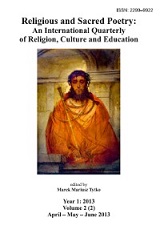British Natures, Polish Poets: the Continents Group as an Example of Ethnic British Literature
British Natures, Polish Poets: the Continents Group as an Example of Ethnic British Literature
Author(s): Charles Stephen KraszewskiSubject(s): Language and Literature Studies
Published by: Fundacja Naukowa Katolików »Eschaton«
Keywords: Kontynenty Group; Polish Poetry Abroad; Literary Diaspora; Ihnatowicz Janusz Artur; rev. (1929-); Sito Jerzy S. (1934-2011); Śmieja Florian (1925-); Bieńkowska Danuta Irena (1927-1974)
Summary/Abstract: Comparative analysis of the Polish language poetry of several twentieth century Polish poets living in Great Britain. The article covers the poetry of Rev. Janusz A. Ihnatowicz, Jerzy S. Sito, and others. The thesis of the article is as follows: This group of Polish poets, who were to later group themselves informally around the literary magazines Kontynenty and Merkuriusz, are products of a Polish family and national background. However, arriving in Great Britain as war refugees at the beginning of the 1940s, they grew up in a British cultural environment. The literary influences that worked upon them were the same as those working on their ethnically British colleagues. As a result, the poetry of the “Continental” poets reveals them as British poets, composing in Polish. The “Continental” poets are thus an interesting example of “ethnic” literature in the British homeland, which was once homogeneous, but since the Second World War has become ever more a land of many peoples and tongues. The author of the article used a comparative method (comparing the authors in question among themselves, and to the authors who influenced them, such as T.S. Eliot and G. M. Hopkins) as well as a historical-critical method (setting them in the historical context of Great Britain and Poland). Main results: Since arriving in Great Britain as war refugees at the beginning of the 1940s, the poets in question grew up in a British cultural environment. The literary influences that worked upon them were the same as those working on their ethnically British colleagues. As a result, the poetry of the “Continental” poets reveals them as British poets, composing in Polish. The “Continental” poets are thus an interesting example of “ethnic” literature in the British homeland, which was once homogeneous, but since the Second World War has become ever more a land of many peoples and tongues. The results are limited to close readings of selected poems; therefore, the conclusions obtained by this essay may be broadened and deepened by further scholarly study, concentrating on a greater number of poets, different poets, different verses by the poets included. Practical implications of the article. The results of the analysis can be applied to practical didactics: i.e. the teaching of British literature, Polish literature, or literature in general; they also might lie in the area of supportive texts for psychological / sociological studies dealing with language acquisition and the cultural implications of site and maturing. Social implications of the article: Ancillary evidence to discuss the effect of several cultural influences on the same young people. The novelty of the article (new insights introduced by the article with regards to the current literature). To my knowledge, no work speaking of the Continental Group of poets focuses on them as products of Anglo society.
Journal: Religious and Sacred Poetry: An International Quarterly of Religion, Culture and Education
- Issue Year: 2013
- Issue No: 2
- Page Range: 97-116
- Page Count: 20
- Language: English

